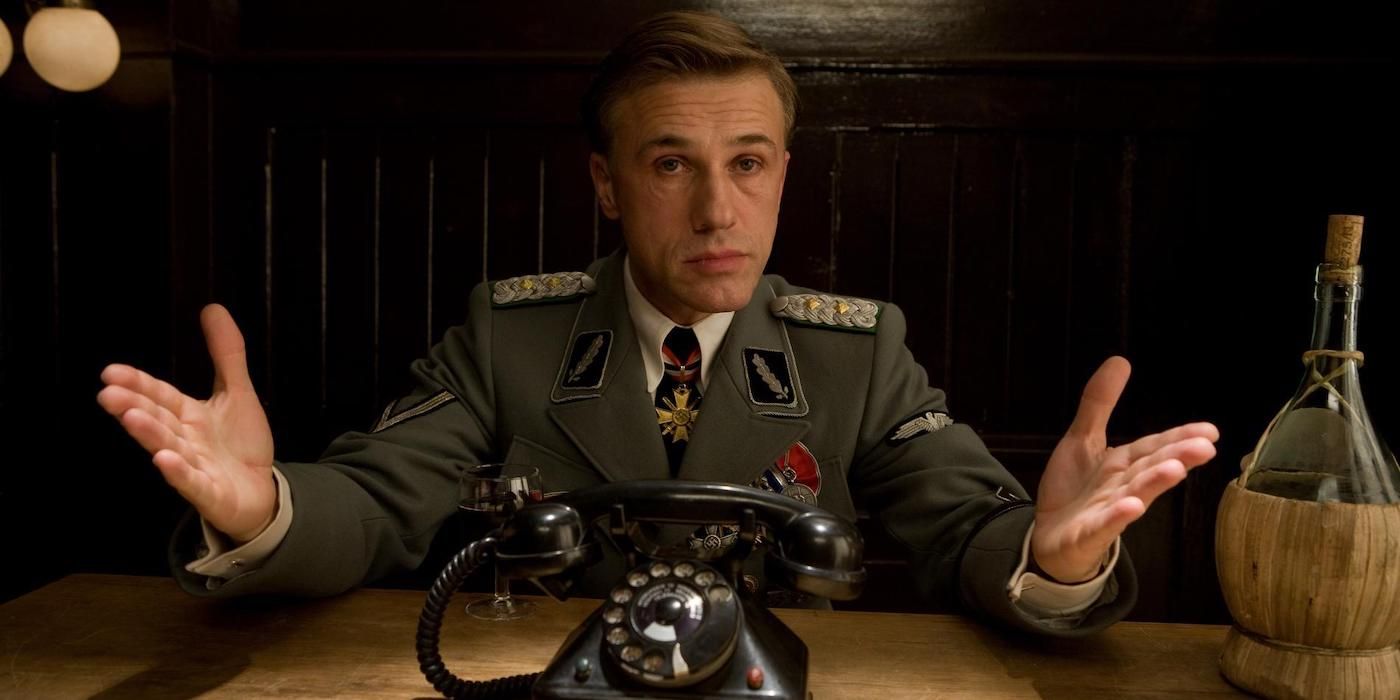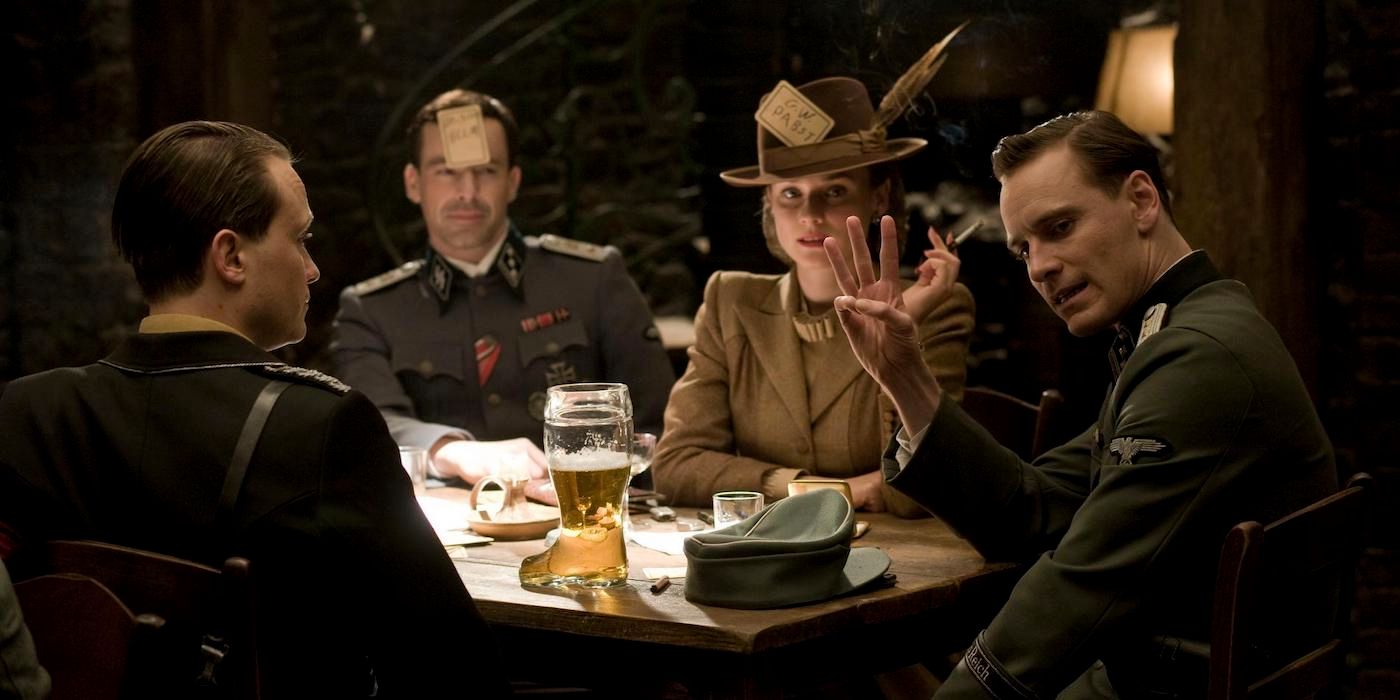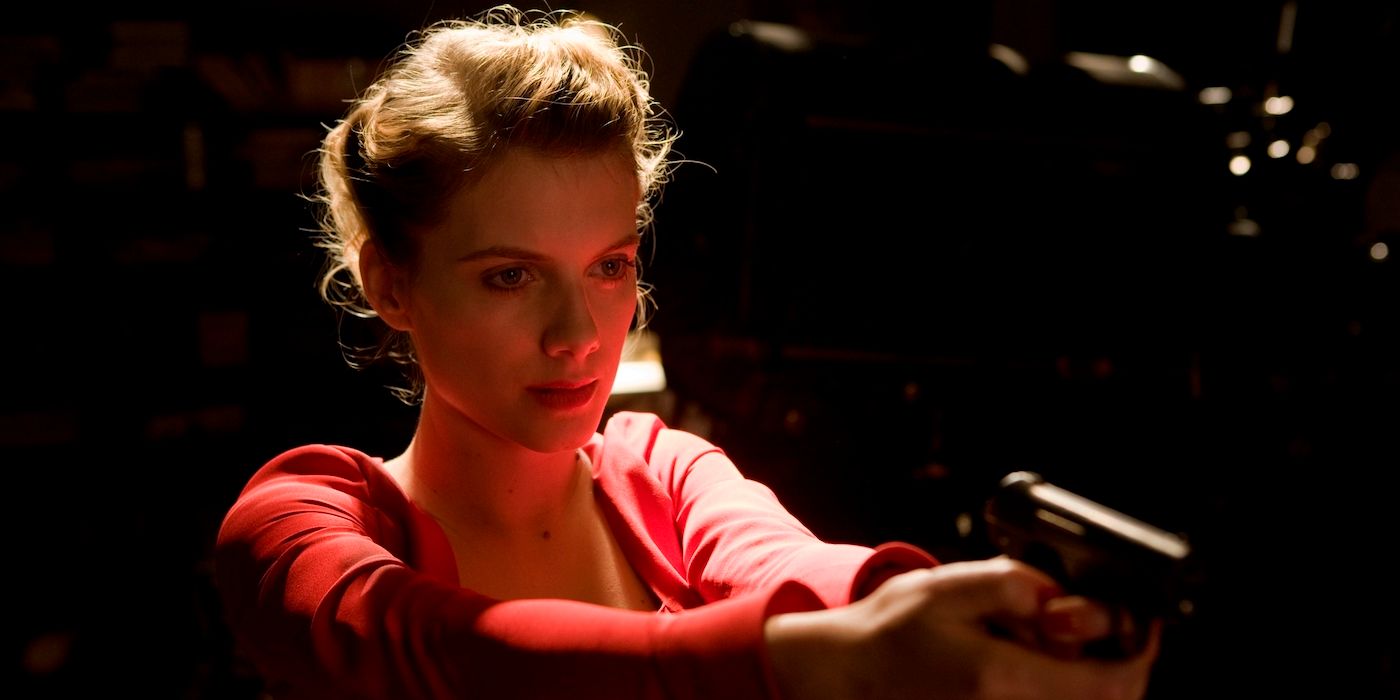Inglourious Basterds 4K Review: Tarantino's New, Unbeatable Benchmark
Inglourious Basterds ends with a cocky called shot, a Babe Ruth final line. After carving a swastika into Hans Linda's Nazi face (Christoph Waltz), Aldo Raine (Brad Pitt) and Smithson Utivich (B.J. Novak) look directly at the camera, tracked to Hans' POV. And Aldo says, "You know somethin', Utivich? I think this just might be my masterpiece." Cut to credits — well, credit, singular. Quentin Tarantino, having his main character calling the art he made a masterpiece, before using the power of editing to call himself the master, the transference of his opinion of his own work very definitively complete.
Annoyingly, the fucker is correct. Inglourious Basterds, now available on a beyond-handsome 4K blu-ray transfer, remains a fiendishly watchable, entertaining, and potent apotheosis of all of Tarantino's pet passions and aesthetic impulses. His love of chapter-driven storytelling, prolonged suspense sequences, sudden bursts of violence, revisionist historical muckraking, the pursuit of vengeance, the observable power of cinema itself — all are on masterful display in the picture.
It's not hard to view it as Tarantino's masterpiece. Or at least his most recent one. Because, annoyingly, it works so well that it casts a Pitz Palu-sized shadow on his recent body of work. It's the formula, the high he's been trying to chase ever since, to increasingly diminished returns.

The sequences in Inglourious Basterds are long, but never boring. They are masterworks of dramatic irony, of ticking time bombs just out of frame, of the agony in ambiguity when (or if) it will explode. The seams of the film's construction — Inglourious Basterds is "a collection of scenes" rather than a flowing narrative — are intentional, heightened by the literal chapter titles punctuating each vignette. But the scenes themself do nothing but flow, demanding attention, heightened by our knowledge that Hans may know the Jewish neighbors are under the floorboards or Dieter (August Diehl) may know his tablemates aren't fellow Nazis. We are played like beautifully dumbstruck fools, along for the smooth ride that only gets bumpy when it needs to.
Languidly paced sequences continue in Tarantino's post-Basterds work, though not always (nor often enough) with the ticking time bomb effect needed to play effectively. The Hateful Eight, particularly in its pre-intermission first act, is essentially the opening Basterds sequence stretched, though never quite snapped with the level of poppiness and pleasurable terror found at the end of the Basterds sequence (the "everyone pukes up poison blood" gestures toward an equivalent level of chutzpah, though it doesn't make up for the lack of tension muddling through the rest of the first half's scenes). Once Upon a Time in Hollywood does add a new, at times appealing wrinkle to this kind of build-up favoring set-piece, concluding stretches of anticipation with crescendos of comedy and pathos instead of violence — think the long sequence of Rick Dalton (Leonardo DiCaprio) trying to successfully guest star on Lancer — but the overall effect is one of deflation rather than elation.

The tenor of historical, trauma-driven catharsis generating all of Inglourious Basterds' moves is primal. The Nazis are pure evil, and their plans to exterminate Jewish people are pure evil. Tarantino knows how good it would feel to see Nazis get a bravado-fueled, rewritten comeuppance that makes our act of revenge a more active choice (and, dovetailing with his love suspense, he knows it will feel better if we have to wait for it).
To its credit, Django Unchained operates in a similar zone of "primal, historical revenge" (slave-owners are pure evil and their plans to own slaves are pure evil) that is nearly guaranteed to elicit an emotional, gleeful response. But to its detriment, this revisitation of revision almost feels callously formulaic, the variables of his previous story generator changed up just so, the seams bristling in that uncomfortable zone of intentionality and sloppiness. It is, by its inadvertent comparison to such a finessed piece of work, doomed to feel like a minor riff rather than a newly formed theme, and that's before you get into Django's basic sloppiness in flowability (that "Australian Tarantino" vignette simply smashes the stop button in an aggravating way). As for Once Upon a Time in Hollywood, while it should feel, in theory, good to watch rat bastard Charles Manson get what's coming to him before he can murder Sharon Tate, the practicing scene, where Rick and Cliff Booth (Brad Pitt) annihilate the ever-loving hell out of Manson's "family members," is robbed of its emotional potency because of the intellectual fact that we are watching two grown men devastate younger, emaciated, brainwashed women into grotesque puddles of violence. Again, perhaps that feeling of sloppiness is intentional, but when coupled with its construction relative to Inglourious Basterds' immediacy of "It feels good to watch Hitler's brains get shot up," it provokes frowns in comparison.
While we're on Once Upon a Time in Hollywood, that film is, from the title down, designed to be a love letter to cinema, one of Tarantino's chiefest pleasures (what is a Tarantino movie if not a condensed collection of Tarantino's favorite movies?). This love is expressed in ambulatory, shaggy matters; we know the plot, we know the inevitable conclusion, and we know Tarantino is driving us to it, but he's barely hitting 25 mph, more content to stop and point at the meticulously reconstructed Musso & Frank's along the way (another example of the suspense plotting without the vital bomb under the table). If you are down with those vibes, God be with you. But when compared to the expressions of cinematic potency in Basterds, it feels, simply, inadequate. Inglourious Basterds suggests that the medium of film, storytelling, voicing one's heretofore voiceless perspective is so powerful that it can rewrite history and destroy tyrants. That is a powerful thing to say, and you believe it when you watch the film. Once Upon a Time in Hollywood does not deign to make such a statement about the medium it's set in and captured on. It's, again, minor, and when walking in the same thematic after such a major film, all you can focus on is the difference in shoe size.

Before that concluding "masterpiece" scene and line, the Basterds' mission is so thoroughly concluded that the entire damn cinema is blown up; even the vessel of power Tarantino reveres so dearly had to be sacrificed. Perhaps for Tarantino to reach a similar creative peak, to find his new masterpiece, he needs to burn all of the tricks weaponized to such a powerful point here, and build something new.
Inglourious Basterds is now available on 4K UHD blu-ray.


التعليقات على الموضوع